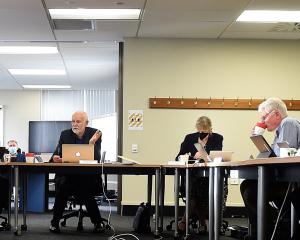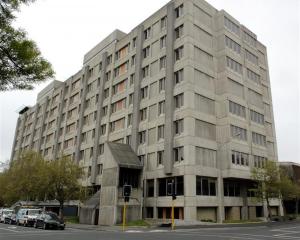Finance and funding general manager Robert Mackway-Jones said until now two cards had been held by the finance department, one in Otago and one in Southland, and a third by the board library in Southland (for online purchases).
Now the two district health boards had merged, the two finance department cards would reduce to one.
Most use of the card was for overseas transactions including conference bookings.
Mr Mackway-Jones said he had also used it to charge meals and taxis in Christchurch and Wellington on monthly work visits.
Chief executive Brian Rousseau approved these monthly and typically the expenditure would be between $100 and $200 a month, although in the last month, because he had been constantly in Dunedin, expenditure was about $400. (Mr Mackway-Jones lives in Invercargill.)The card limits were between $15,000 and $25,000 so monthly expenditure did not exceed that.
On the Southland card he held, the expenditure would generally have been between $4000 and $5000 monthly. (His department is compiling a summary of the transactions for the Otago Daily Times.)Spending on hospitality or gifts did not come under card transactions.
Such spending did occur by the board, but infrequently, and approvals were required in line with the board's sensitive expenditure policy.
"I am confident that the DHB culture is very frugal on that expenditure, to the point we sometimes get criticised over a lack of expenditure on, say, farewell gifts for long-serving staff retirements."
The chairwoman of the board's audit finance and risk management committee, Susie Johnstone, said the board approach to such things as credit card spending was cautious.
Both of the old boards always had policies on spending, but these had been robustly reviewed following Otago's $16.9 million fraud, and continued to be reviewed regularly to ensure they were working.
The board's policies had received good feedback from internal and external auditors, she said.
The credit card policy is linked to the board's policies on procurement, delegation of authority, code of conduct, staff travel and sensitive expenditure.
Mr Mackway-Jones said card use was subject to yearly scrutiny by Audit New Zealand and no issues had been raised about this.
While the board has provision for purchase cards (known as p-cards) the only ones issued at the moment were for fuel and car washes for fleet vehicles. Monthly expenditure trends and kilometres travelled were reviewed.
Mr Mackway-Jones said there were no plans to issue other p-cards.
In the credit card policy there is scope for the board chairman and the chief executive to have p-cards with a limit of $1000 for low value business expenditure, but neither Errol Millar or Mr Rousseau has one.
Mr Millar said it was his personal policy not to take up the option of a credit card on any of the organisations he served.
This removed room for doubt over any spending.
Instead, if he had expenses on board business he paid the bill and claimed the money back.
Asked if this might mean that he was sometimes out of pocket if he forgot to claim, he said he was well organised with his claims, but if he happened to lose a taxi chit he did not bother to try and make a claim for it.
"It probably does cost you a little bit, but it's better to be safe than sorry."
Mr Millar, who has to sign off the claims made by board members and the chief executive Brian Rousseau, said he was very impressed with the integrity and professionalism displayed by all.
All board members took a responsible and fairly modest approach and it was likely sometimes they were out of pocket.
The board's policies on spending and claims were complex, and while he was familiar with the detail he did not expect all members to be.
He advised members to contact him, Mr Rousseau or the funding and finance general manager Robert Mackway-Jones if they wondered whether they should be claiming for something.
Amounts paid to Otago District Health Board members in the financial year ended in June 2009, including meeting fees and travel allowances, ranged from $24,000 to $45,000.












